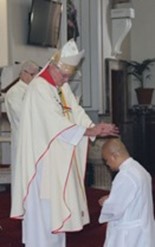While I was there, I began to read the big 300 page Final Report for the Plenary Council – Phase I: Listening and Dialogue. This can be found on the Plenary Council website. You can either read it online or download a print version. It does make for interesting reading, however I think it needs to be read in bite-size portions. I am sure that you are aware that six national themes for discernment have been identified from the Listening and Dialogue process. The following question has been posed around each of these themes:
How is God calling us to be a Christ-centred Church that is:
- Missionary and Evangelising
- Inclusive, Participative and Synodal
- Prayerful and Eucharistic
- Humble, Healing and Merciful
- A Joyful, Hope-filled and Servant Community
- Open to Conversion, Renewal and Reform
As you can imagine, the Report is very detailed, with some of the chapters covering the methodology, statistical data and report findings. However, Chapters 4 to 17 provide details on the main findings that emerged from an analysis of the submissions made in the Listening and Dialogue phase.
For those of you who participated in the Listening and Dialogue phase, I think it is important for you to know that the information, ideas, concerns and stories that were submitted form part of this extensive report, and can be accessed by anyone. I have included below what forms the basis of these 14 chapters.
 Chapter 4 addresses the topic of “Love God, Love Neighbour”—a phrase voiced by many participants. This chapter includes themes such as greater trust, faith and hope in God, and a greater focus on Christ and the Word of God. Other themes such as care for neighbour, faithfulness to Church teaching, greater support for faith formation and a renewed call to holiness are also discussed here.
Chapter 4 addresses the topic of “Love God, Love Neighbour”—a phrase voiced by many participants. This chapter includes themes such as greater trust, faith and hope in God, and a greater focus on Christ and the Word of God. Other themes such as care for neighbour, faithfulness to Church teaching, greater support for faith formation and a renewed call to holiness are also discussed here.
Chapter 5 addresses the topic of the Mass and themes associated with it. Within this chapter are found themes such as better attention to all aspects of the liturgy, inclusion of the divorced and remarried, increasing opportunities for Eucharistic Adoration and making the Mass appealing to youth and children, amongst many others.
Chapter 6 looks at the sacraments, in particular, those of Holy Orders and Marriage. Themes such as the ordination of women, a greater focus on deacons, restoring the Third Rite of Reconciliation and providing better preparation and support for engaged and married couples are discussed here.
Chapter 7 addresses the topic of leadership and Church governance. This chapter includes themes such as the need to end clericalism, promote servant leadership and encourage a greater involvement of the laity. Also found are themes related to the desire for a new leadership and governance model, a greater leadership role for women within the Church and better selection and formation of candidates for the priesthood.
Chapter 8 looks at the responses pertaining to sexual abuse and the Royal Commission into Institutional Responses to Child Sexual Abuse. A number of themes emerged, such as the need for more transparency, accountability and balanced news reporting, greater concern for victims and survivors, and better implementation of the Royal Commission recommendations.
Chapter 9 addresses issues relating to social justice and the environment. Within this chapter are found themes relating to a greater inclusion of all people, and ending discrimination of LGBTI people. The chapter also discusses themes such as reducing inequality in society, having greater care and respect for the environment, and addressing the defence of religious freedom and right-to-life issues in Australia.
Chapter 10 looks at responses pertaining to outreach. This chapter includes themes such as the need for greater connection with, and inclusion of, Aboriginal and Torres Strait Islander Australians, encouraging non-Church-going Catholics to return to the practice of their faith, providing outreach to same-sex-attracted persons, and also to young people and the wider community.
Chapter 11 addresses the topic of evangelisation. Within this chapter are found themes such as sharing the faith with others, and evangelisation in, and of, the family. Also discussed are themes related to a greater focus on mission, encouraging vocations and the need for greater evangelisation in Australian society.
 Chapter 12 considers responses discussing the need for more listening. Three themes—listening to one another more, listening to the Holy Spirit and the need for the Church hierarchy to listen to the laity more attentively—are discussed here.
Chapter 12 considers responses discussing the need for more listening. Three themes—listening to one another more, listening to the Holy Spirit and the need for the Church hierarchy to listen to the laity more attentively—are discussed here.
Chapter 13 looks at youth ministry and related themes. It contains themes such as the need for better training and support for youth leaders, better youth ministry resources and programs, better youth faith formation and for provision of more youth facilities.
 Chapter 14 addresses the topic of Catholic education in schools. Within this chapter are found themes such as the need for better teachers in Catholic schools, and for more authentic teaching of the Catholic faith. It also addresses better faith formation for teachers, greater faith formation for parents and the need for more chaplains and youth ministers in schools.
Chapter 14 addresses the topic of Catholic education in schools. Within this chapter are found themes such as the need for better teachers in Catholic schools, and for more authentic teaching of the Catholic faith. It also addresses better faith formation for teachers, greater faith formation for parents and the need for more chaplains and youth ministers in schools.
Chapter 15 looks at the topic of parishes. A number of themes are addressed, such as the creation of stronger parish communities, the formation of small Christian communities, an emphasis on parish pastoral councils, the need to create more welcoming parishes and special care for rural parishes.
Chapter 16 addresses responses that discuss bringing the Church into the 21st century. Within this chapter are found themes such as the need for a better promotion of the Church through a range of communication channels, a need to modernise Church teachings and the request for a radical overhaul of the organisational structure of the Church.
Chapter 17 looks at responses asking for better Plenary Council processes. Within this chapter are found themes relating to the scepticism that surrounds the process, the concerns about its potential to make a change in the Church and the disappointment of some with regards to the lack of lay people and women given decision-making roles on the Council.
In my reading thus far, I am impressed that the researchers and writers of this Report have managed to capture the broad spectrum of opinions that were shared, and that exist in the one Catholic Church. For some, there is a wish for us to return to the pre-Vatican II Church while others wish for radical reform. No wonder we are being asked to enter into a Listening and Discernment phase of Listening to what the Spirit is saying.
Over the next couple of weeks, we will be distributing to parishes our suggested diocesan process to engage with the themes of the Plenary Council and our own Diocesan Synod processes.
So now to share with you an amazing conversation which Allen and I had with a young man, Joshua, in his 20’s, today, Sunday, at St Peter Chanel’s Mass Centre, which forms part of St Christopher’s Cathedral Parish in Canberra. He joined the seat in which we were sitting, and after Mass we began a conversation with him, only to discover that he was not a Catholic, but had come to Mass to explore what was on ‘offer’. His background was with the Sydney Anglicans and he is presently part of a Pentecostal Church in Canberra. He indicated he was seeking something deeper and found the Mass to be a more mystical experience than any previous church service he had attended. We spoke to him about the Mass and the symbols contained in the many beautiful stained-glass windows, which form part of every wall of this beautiful, restful and contemplative space at Yarralumla. Allen and I are usually busy at our own Cathedral during a Sunday Mass, so it was good to sit with this young man and to speak with him about his seeking something deeper and more meaningful. I hope some other people discover Joshua over the coming weeks or months. We left him in prayer and felt as if the Holy Spirit had put us and Joshua there for this encounter of faith.
And yet this chance encounter which lifted my spirit was tinged by the reality that our own family who we were visiting did not join us for Mass. The young man was seeking a conversion of heart, but it appears that our own children are not there yet.
I am convinced that this is why it is important that we participate in the second phase of the Plenary Council process of Listening and Discernment. Please continue to pray for the Plenary Council and our own Diocesan Synod, as we continue on our journey of preparation, discovery and discernment.

